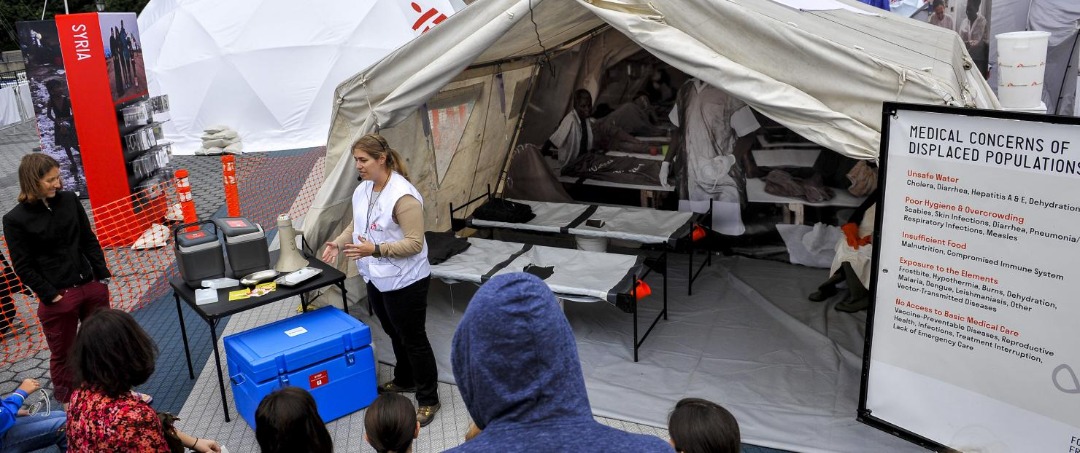Giving Tuesday: Rise to MSF’s humanitarian challenge
This Giving Tuesday, join our community of supporters to collectively raise $3 million and help MSF provide emergency medical care to people around the world.

The impact on people living with HIV
30 NOV 21 30 NOV 21 World AIDS Day 2021: Myanmar’s political turmoil threatens HIV care

COVID-19 Pandemic Response
MSF teams continue to support medical services in vulnerable communities facing the COVID-19 pandemic in over 70 countries worldwide
MSF International
The MSF associations, the International President and individuals are all members of MSF International.
The International General Assembly is the highest authority of MSF International. It is responsible for safeguarding MSF’s medical humanitarian mission, and provides strategic orientation to all MSF entities. The assembly meets annually, and comprises two representatives of each association, two representatives elected by the individual members of MSF International, and the International President (who is elected by the assembly).
International Board
The International Board acts on behalf of and is accountable to the International General Assembly. It is made up of representatives of the operational directorates as well as a group elected by the International General Assembly, and is chaired by the International President.
MSF International facilitates coordination among the various MSF entities and collates and disseminates information. Based in Geneva, it provides coordination, information and support to the MSF Movement, and implements international projects and initiatives as requested. Its costs are paid by MSF’s national executive offices
MSF Worldwide Movement

© MSF
Médecins Sans Frontières (MSF) is an international, independent, medical humanitarian organisation that delivers emergency aid to people affected by armed conflict, epidemics, pandemics, natural disasters and exclusion from healthcare. We offer assistance to people based on need and irrespective of race, religion, gender or political affiliation.
We provide medical care to help people survive catastrophic situations, where communities and health structures may be overwhelmed. Our core work is providing emergency medical assistance in situations of armed conflict.
Our actions are guided by medical ethics and the principles of neutrality and impartiality. We do not take sides but seek to bring assistance to those who need it most urgently. In situations of conflict, we do not accept funds from governments or other parties who are directly involved.
MSF has a commitment to address the suffering people endure and the obstacles encountered in providing assistance. We are constantly seeking to improve the quality, relevance and extent of our assistance, and we are dedicated to the pursuit of innovation. When we witness serious acts of violence, neglected crises, or obstructions to its activities, MSF may speak out about this.
MSF was founded in Paris, France in 1971. Today, MSF is a worldwide movement of 25 associations. MSF International, which binds these associations together, is based in Geneva, Switzerland.
MSF is an independent, self-governed, non-profit organisation. It operates programmes in more than 70 countries worldwide. Its work is carried out by tens of thousands of health professionals, logistical and administrative staff, the vast majority of whom come from the countries where the organisation is providing medical assistance.
MSF Worldwide Movement
MSF is a worldwide movement of current and former field staff, grouped into national and regional associations. Collectively, they make sure that MSF stays true to its mission and principles.
Currently, there are 25 associations. All are independent legal entities, and each elects its own board of directors and president. Most associations have an executive office that raises funds and recruits staff for MSF’s operations.
The associations are linked to operational directorates. The five operational directorates, based in Paris, Brussels, Amsterdam, Barcelona and Geneva, manage MSF’s humanitarian assistance programmes. Decentralised units such as a supply centre in Bordeaux, a specialised HIV/AIDS unit in Johannesburg, and an evaluation unit in Vienna, also support our operations.
MSF offices, units, directorates and associations interconnect and work together in various ways, and are formally bound as one movement by a shared name, a shared commitment to the MSF Charter and principles, and shared membership of MSF International.